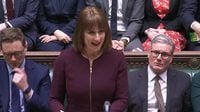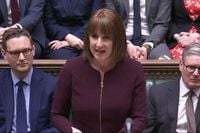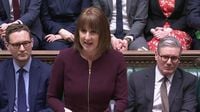In a tense session of the House of Commons on March 26, 2025, Chancellor Rachel Reeves delivered her Spring Statement, outlining a series of public spending cuts aimed at balancing the nation’s finances without raising taxes. As economic forecasts from the Office for Budget Responsibility (OBR) revealed that the UK’s growth outlook has been halved from 2% to 1%, Reeves faced sharp criticism from opposition leaders, particularly Shadow Chancellor Mel Stride, who accused her of 'tanking the economy.'
Reeves, defending her record, pointed to global uncertainties as a significant factor impacting the economy. She stated, “I can confirm to the House that the OBR have upgraded their growth forecast next year and every single year thereafter,” projecting GDP growth of 1.9% in 2026, 1.8% in 2027, 1.7% in 2028, and 1.8% in 2029. However, the Chancellor acknowledged the necessity for austerity measures, announcing savings of around £14 billion to meet her goal of balancing day-to-day spending against tax receipts.
During the session, Stride highlighted the consequences of Reeves’ policies, claiming that inflation is now running at twice the levels forecast under the previous Conservative government in 2024. He remarked, “She borrowed and spent and taxed like it was the 1970s,” emphasizing the burden of the highest tax rates in history under her leadership. Stride called for reassurance from Reeves that taxes would not be raised further in the upcoming autumn budget, expressing concern for the millions of citizens grappling with financial distress.
Reeves announced significant changes to welfare, including a 50% cut to the Universal Credit health element for new claimants, while the standard allowance will increase from £92 per week in 2025-26 to £106 by 2029-30. The OBR has projected that these welfare reforms will push an estimated 250,000 people, including 50,000 children, into relative poverty by the end of the decade. Despite these cuts, Reeves insisted that households would be better off under her government, citing a forecast that indicated an average increase of £500 a year in disposable income.
Critics, including Oxfam, condemned the Chancellor’s approach, stating that the Spring Statement marks a “new low in the fight against poverty and inequality.” Oxfam’s senior policy adviser, Anna Marriott, argued that the government is prioritizing the wealth of millionaires over the needs of vulnerable populations. “These cuts are not just numbers on a balance sheet but will cost lives and have a devastating impact on people facing conflict, poverty, and climate disasters around the world,” Marriott stated.
In response to Stride’s accusations, Reeves defended her fiscal policies, asserting that she had restored the fiscal headroom “in full.” She described the need for strict fiscal rules, emphasizing that these measures are vital for bringing stability to the economy. “These fiscal rules are non-negotiable. They are the embodiment of this government’s unwavering commitment to bring stability to our economy and ensure security for working people,” Reeves said.
The Chancellor also announced an additional £2.2 billion boost to the Ministry of Defence’s budget, underscoring the government’s commitment to national security amidst rising global tensions. She stated that 10% of the Ministry of Defence’s equipment budget would be allocated to new technologies, including drones and AI-enabled systems, aimed at enhancing the UK’s defense capabilities.
While Reeves painted a picture of economic recovery and growth through planned reforms, Stride remained skeptical. He criticized the government’s track record, citing rising inflation and unemployment as evidence of mismanagement. “The shadow chancellor has chosen to be reckless with fiscal headroom,” he remarked, suggesting that the government’s decisions have led to an unstable economic environment.
Reeves acknowledged the challenges ahead, particularly in light of the OBR’s revised forecasts. She described the current economic climate as a “cold, hard reckoning,” stating that the government must take decisive action to secure Britain’s future. “The world is changing, and no one can be in any doubt about it,” she said, urging her party and the opposition to unite in support of her growth agenda.
In a broader context, the Chancellor’s statement reflects ongoing debates about economic management and social welfare in the UK. As the government grapples with the consequences of its policies, the impact of these decisions on vulnerable populations remains a critical concern. The opposition’s calls for increased investment in public services and social safety nets highlight the contrasting visions for the country’s economic future.
As the Spring Statement unfolds, the political landscape is poised for further scrutiny. With the next budget on the horizon, the government faces mounting pressure to address the concerns of both the public and opposition parties. The coming months will be pivotal in determining the trajectory of the UK economy and the effectiveness of Reeves’ policies in fostering growth while ensuring social equity.







